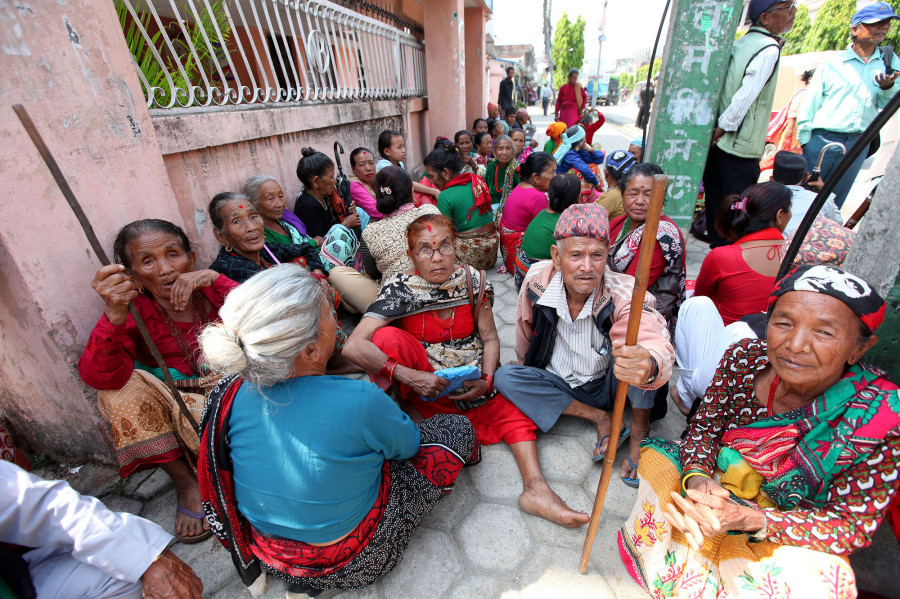National
Elderly still deprived of fundamental rights despite legal safeguards
Many elderly Nepalis are excluded from state benefits and essential services, a new report points out.
Manya Humagain
Nearly two decades after the Senior Citizens Act came into force, senior citizens across the country continue to face systemic neglect, exclusion and rights violations, according to a new report by the National Human Rights Commission (NHRC).
The law, enacted in 2006, guarantees senior citizens a range of protections and entitlements, including monthly allowances, official identity cards, access to healthcare and legal safeguards. However, the NHRC’s findings reveal a gap between the legal protection and its implementation.
Many elderly individuals, particularly from the marginalised communities, still lack basic identity documents such as citizenship certificates, senior citizen identification cards, or health insurance. The law mandates that senior citizens receive their identity cards through local authorities, but they often have to go through bureaucratic hurdles to obtain them. Not having identity cards leads to broader consequences.
“Without legal identity, eligible seniors are often excluded from state benefits and essential services,” the report states. For instance, a Janaki Old Age Home resident in Janakpur remains without citizenship, despite his stepson serving as the district’s Chief District Officer.
The NHRC warns that this legal invisibility violates Article 10 of Nepal’s constitution and flouts the country’s international obligations. The commission recommends simplifying legal provisions for obtaining identity documents, especially for marginalised groups.
Although some seniors live with family and enjoy a degree of respect, many are sidelined in both public and private spheres. Social security allowances and pensions have helped in some cases, but those experiencing neglect, social stigma, or legal difficulties are often isolated or even abused.
The report documents cases of physical and emotional abuse, prompting some seniors to seek refuge in old age homes. While Section 4 of the Act calls for family-based care and allows complaints against negligent relatives, enforcement remains weak.
The burden of caregiving also falls heavily on elderly individuals whose children have migrated abroad. Many are tasked with raising grandchildren at the cost of their well-being, facing loneliness, anxiety, and declining health.
Although the Act guarantees seniors the right to manage their movable and immovable property, implementation has been inconsistent. Family disputes over inheritance are common, with some seniors pressured to transfer property under duress. Legal safeguards are rarely enforced to protect them from exploitation.
Social security allowances remain a lifeline for many, but accessing them is not free of hassle. Banking hurdles, inaccessible procedures and physical disabilities prevent many from receiving their allowances worth Rs4,000 monthly. Some are mistreated by bank staff, while others in old-age homes are entirely excluded.
Because of the reluctance, transport concessions guaranteed by the law haven’t been adequately implemented by service providers. Reserved seating and discounted fares often exist only on paper.
Access to healthcare, another key provision of the Act, remains limited. Most institutions fail to provide prioritised care or discounts for seniors. Budgetary constraints, staffing shortages, and inadequate infrastructure severely hinder service delivery. In Madhesh Province, for instance, Rs1 million allocated for senior citizens’ free medicines is considered grossly inadequate.
The report by the constitutional watchdog has revealed that awareness of rights under the Act is very low. Cases of abuse or neglect are often resolved informally due to social stigma, with victims reluctant to file formal complaints. Although courts prioritise cases involving senior citizens, the absence of dedicated benches and the limited availability of free legal aid hamper justice.
The situation of the elderly in prisons is even grimmer. Around 1,000 elderly individuals are currently behind bars. Of them, 43 percent were convicted of rape, raising complex moral and social questions. Although the law allows for the exemption of imprisonment for those over 75 or with disabilities, a lack of appropriate care facilities has rendered the provision largely ineffective.
Likewise, the Central Senior Citizens Committee, mandated under Section 14 of the Act to coordinate national efforts for elderly care, remains largely inactive. Key positions remain unfilled, no directives have been issued, and provincial and district-level committees are yet to be formed.
“The old age homes continue to struggle with meagre donations and inconsistent government support, resulting in chronic underfunding, poor infrastructure, and substandard living conditions,” reads the report. “The government must move beyond tokenism and take urgent steps to enforce the law in letter and spirit before another generation of seniors is left behind.”




 13.24°C Kathmandu
13.24°C Kathmandu














